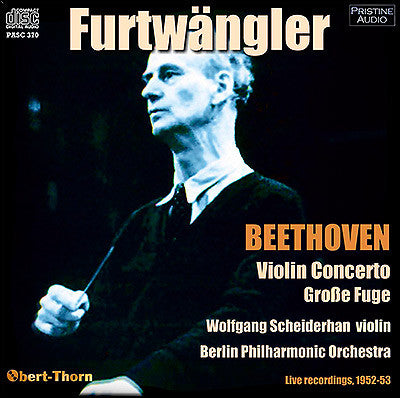
- Producer's Note
- Full Track Listing
- Cover Art
Elusive live Furtwängler recordings of Beethoven's Violin Concerto & Große Fuge
Superb new transfers by
The present recording of the Beethoven Violin Concerto with Schneiderhan and Furtwängler is among the most elusive of the conductor’s performances on CD. First released in 1964 as part of a series of Deutsche Grammophon LPs marking the tenth anniversary of the conductor’s death, this broadcast has received less attention over the years than his three recordings with Menuhin (two studio, one live) and the wartime version with Erich Röhn taped at the last BPO concert in the old Philharmonie before it was destroyed. It has been transferred here from a 1970s monaural Heliodor LP pressing, as has the Grosse Fuge, which has a similar release history.
The pitches have been left as they appear on the LPs at around A4=445Hz when played at 33.3 rpm, which is in line with what is known about the BPO’s higher tuning during this period and the evidence of their other contemporaneous recordings.
-
BEETHOVEN Violin Concerto in D major, Op. 61
Wolfgang Schneiderhan violin
Recorded during the performance of 18 May 1953 in the Titania-Palast, Berlin
First issued on Deutsche Grammophon LPM 18855 -
BEETHOVEN Große Fuge, Op. 133
Recorded during the performance of 10 February 1952 in the Titania-Palast, Berlin
First issued on Deutsche Grammophon LPM 18859
Berlin Philharmonic Orchestra
Wilhelm Furtwängler conductor
Producer and Audio Restoration Engineer:
Cover artwork based on a photograph of Furtwängler
Total duration: 63:09
Fanfare Review
Those with a serious interest in Furtwängler should find this of real value.
Wilhelm Furtwängler left five recordings of
Beethoven’s Violin Concerto, with three different soloists. There are
two commercial studio recordings, both with Yehudi Menuhin, and three
live performances, one each with Menuhin, Erich Rohn, and Wolfgang
Schneiderhan. This Schneiderhan performance (May 18, 1953) has long been
the neglected stepchild of the five, and now it receives what is by far
its finest transfer, overseen by
In his invaluable book The Furtwängler Record,
John Ardoin dismisses Schneiderhan’s performance as “technically
efficient but poetically deficient,” and calls the entire performance
“aloof, often brusque and monochromatic.” That doesn’t match what one
hears on this
To be sure, this may still be the least desirable of the Furtwängler performances of this concerto, and only serious Furtwängler collectors are likely to be interested in it. The wartime performance by Rohn, part of the final concert at the old Philharmonie prior to its being bombed by the Allies, has about it the white heat we have come to expect from Furtwängler performances of that period, and Rohn is on fire throughout. The Menuhin performances are masterful; two supreme musicians meeting on common ground. The 1947 Lucerne Festival performance is perhaps the finest—in part fueled by the special significance of Menuhin’s decision to be, quite consciously, the first Jewish soloist to appear with Furtwängler after the war. Menuhin vigorously defended the conductor against those who pilloried him for remaining in Germany during the war years, and offered to perform with him just months after the conductor had been officially de-Nazified.
Getting back to this particular performance, one of its singular features is Schneiderhan’s use of the Joachim cadenzas instead of the more commonly heard Kreisler ones. The overall performance is more middle-of-the-road than the others. Schneiderhan does not provide the incendiary passion found in the Rohn performance nor the majesty and extraordinarily expressive emotion in the Menuhin performances. The slow movement in the Menuhin versions displays a freedom that virtually renders bar lines invisible. In comparison with that, Schneiderhan can seem a bit pedestrian. But when heard without adding the context of other performances, there is in fact real poetry in the Larghetto here, and genuine thrust and dramatic weight in the outer movements.
As filler,
Overall this constitutes an important release on
the
Henry Fogel
This article originally appeared in Issue 36:6 (July/Aug 2013) of Fanfare Magazine.

